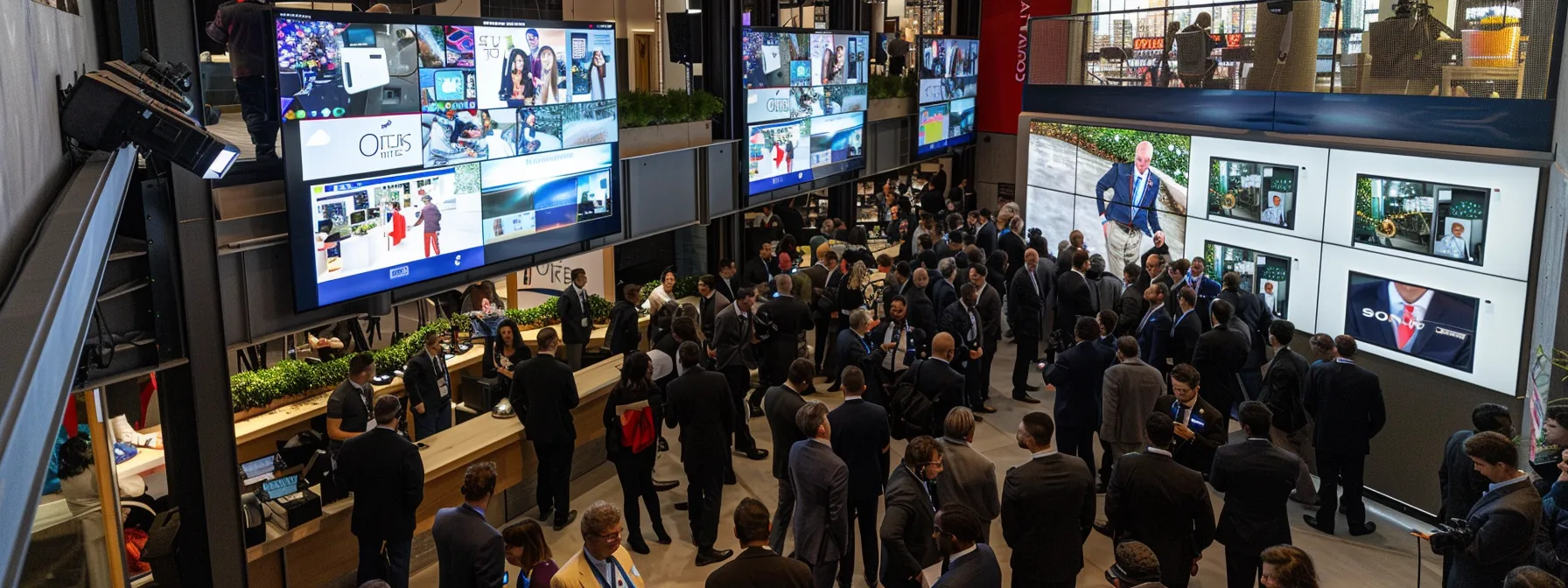Planning a corporate event is no small task—it demands precision, authority, and an understanding of your target audience to ultimately boost sales and credibility. This guide acts as your comprehensive map, leading you through essential checkpoints from establishing goals to detailed execution. For organizers, uncertainty can be a major hurdle, but with this checklist, you’ll volunteer clarity and control back into your hands. Engaging with this content equips you with the knowledge to select the ideal venue, manage a precise budget, and market your event with confidence—all designed to ensure your next corporate event is a resounding success.
Key Takeaways
- Effective event planning aligns individual goals with the company‘s broader mission
- Meticulous budgeting with contingency plans ensures financial oversight for event success
- Strategic marketing across multiple channels maximizes event visibility and attendance
- Streamlining operations and logistics enhances attendee experience and satisfaction
- Prompt issue resolution reflects a commitment to service excellence and maintains event integrity
Establish Clear Objectives for Your Corporate Event

Embarking on a corporate event requires a strategic approach, starting with identifying the target audience. The foundation of a successful gathering hinges on defining specific goals and outcomes, which should mirror the company’s broader mission. This ensures every aspect, from the leveraging of technology to the incorporation of social media for greater attention and accessibility, aligns seamlessly. Subsequent sections will delve into how to effectively cater to participant knowledge while also maximizing corporate objectives.
Identify Your Target Audience
Understanding the community you aim to reach is critical when identifying your target audience for a corporate event. Consider demographics, professional roles, and what attendees seek to gain from the event in terms of education, networking, or entertainment. A well-defined audience ensures transportation logistics, documentation, and activities are designed to maximize attendee engagement and deliver a compelling return on investment. By tailoring each facet to meet their specific needs, the event experience becomes more personal and effective.
Define Specific Goals and Desired Outcomes
When crafting the goals and desired outcomes for a corporate event, clarity is paramount. Objectives can range from generating leads, fostering industry partnerships, to enhancing the company‘s profile through trade exposure. Smart event management incorporates a landing page for attendee registration, strategic signage for brand visibility, and structured networking opportunities. These outcomes not only support lead generation but also create avenues for meaningful engagement and business growth.
| Objective | Tools | Expected Outcome |
|---|---|---|
| Lead Generation | Landing Page, Signage | Increased prospect database |
| Brand Visibility | Strategic Signage, Media Coverage | Enhanced market presence |
| Networking | Structured Activities, Social Spaces | Strengthened industry relationships |
Align Event Objectives With Company Mission
To ensure corporate event initiatives resonate with a company‘s broader ambition, planners must strategically align individual event objectives with the overarching company mission. This involves first reviewing the firm’s mission statement and identifying core values that can be embodied within the event itself. Doing so amplifies the entire experience for attendees, making every session, photograph op, and networking opportunity a reflection of the company‘s identity and values. Additionally, preparing for contingencies such as weather disruptions or emergencies through comprehensive risk assessment plans reflects a company‘s commitment to safety and efficiency. A post-event debriefing can then measure if the objectives aligned well with the mission, providing actionable insights for future planning.
- Review the company mission to guide event planning.
- Integrate core values in all aspects of the event experience.
- Implement risk management plans for weather and other emergencies.
- Conduct post-event debriefing to evaluate objective and mission alignment.
Develop a Comprehensive Budget Plan

Effective budgeting is the backbone of any corporate event, encompassing the complexity of logistics, customer engagement, and the overall experience. A meticulous budget plan should itemize all anticipated expenses, including analytics to evaluate success, ground transportation, and even the details of a buffet. It must also allocate resources wisely and include contingency funds for unexpected costs. This approach ensures that financial oversight is precise, preventing minute details from slipping through and jeopardizing the event’s success.
Itemize All Expected Expenses
When planning a corporate event, a thorough itemization of anticipated expenses is essential. This includes allocations for email marketing campaigns, data analysis tools, branding materials displaying the company‘s logo, and vital venue information. Furthermore, provisions must be made for catering services to ensure a diverse range of food options meets the expectations of all attendees. By clearly outlining these costs, event planners can offer a well-organized, financially sound event that leaves a lasting, positive impact on its participants.
Allocate Resources Effectively
In the meticulous craft of corporate event planning, the effective allocation of resources is signified not only by the breadth of the budget but also by its strategic deployment. For instance, participants often recall the array of drinks provided—a touchpoint that demands careful budgeting and consideration for diverse preferences. Sophisticated tools like Cvent can facilitate cost-effective decisions, offering a bird’s-eye view akin to a table of contents for event elements ranging from public transport logistics to risk assessment protocols. Event planners must thus master the art of resource allocation, ensuring every dollar is judiciously invested to enhance the attendee experience while adhering to the financial framework designed to deliver a successful corporate event.
Include Contingency Funds for Unexpected Costs
When devising a financial strategy for a corporate event, it is prudent management to include contingency funds within the budget to cover unexpected costs. Such foresight accounts for unforeseen expenditures that may arise due to contract adjustments, digital marketing campaign changes, or even logistical setbacks. Allocating a portion of the budget for such contingencies ensures that the event’s visibility and marketing strategy remain intact, even when faced with unplanned scenarios. This approach not only safeguards the event’s success but also displays a responsible and proactive attitude towards financial oversight.
Choose the Perfect Date and Venue

Selecting an optimal date and venue is integral to the execution of a corporate event. Event planners must contemplate attendee availability and seasonal influences while ascertaining venue suitability. A venue’s capacity and accessibility remain top criteria, ensuring it supports the company‘s needs, whether for a traditional or hybrid gathering. Securing the location demands meticulous contract oversight to ensure no requirement is overlooked, including backup plans. Next sections provide deeper insights into assessing calendar options, venue potential, and contractual safeguards for a seamless corporate event.
Consider Attendee Availability and Seasonality
When charting the course for a corporate event, selecting a date that aligns with attendee availability is pivotal. Seasonality must be considered, as it influences travel conditions, accommodation rates, and participant comfort. A strategically chosen date, void of competing industry events and taking into account typical holiday patterns, will accommodate a broad range of attendees and enhance potential turnout. Event planners should also ensure appropriate insurance coverage and risk management plans are in place to mitigate any unforeseen impact of seasonal variances. Selecting a date that respects attendee schedules and seasonal nuances demonstrates attentiveness, supporting an environment where keynote speeches resonate, poster sessions engage, and brand presence is amplified.
Evaluate Venue Accessibility and Capacity
Evaluating the accessibility and capacity of a venue is pivotal for ensuring equity in attendance and a positive experience for all guests, including those who may need special accommodations. Planners must consider not only the physical space for sessions and meals but also the ease with which attendees, both in-person and virtual, can navigate and interact. A comprehensive evaluation includes scrutinizing the venue’s compatibility with innovative virtual event technologies to guarantee a seamless hybrid experience for remote participants. Adequate capacity planning also anticipates educational breakout rooms and spaces for social gatherings, ensuring the venue meets the event’s varied needs.
Secure the Venue With Proper Contracts
Securing the perfect venue for a corporate event involves more than just earmarking a date on the calendar; it necessitates the careful drafting and negotiation of contracts to ensure every detail is legally documented. From clauses that cover audio-visual requirements for impactful video presentations to stipulations about health and safety protocols, a robust contract acts as a safeguard for both parties. It ensures that necessary facilities for paper materials distribution and specific demands for website and advertising materials at the event are fully understood and agreed upon. Thus, the importance of a comprehensive contract cannot be overstated, serving not only as a practical necessity but also as a vital tool in event planning and execution.
Plan Detailed Event Logistics

Attending to the fine details shapes the bedrock of a corporate event’s success. Planners must devise a step-by-step event timeline to stay on course, often utilizing robust software for precision. Judicious catering and menu selections manage cost without compromising quality, reflecting the event’s sophistication. Additionally, coordinating audio-visual and technical needs is crucial, ensuring messages resonate effectively. When necessary, orchestrating transportation and accommodation logistics covers the last mile in attendee care, possibly impacting revenue indirectly. The upcoming sections will dissect these elements, offering insights essential for a seamless execution.
Create a Step-by-Step Event Timeline
A meticulously crafted step-by-step event timeline is the strategic backbone of any corporate event, presenting an unambiguous roadmap from initial concept to the event’s conclusion. It commences with the preliminary request for proposal (RFP) to secure venues and services, progresses through the detailed project management phases—including schedule coordination, LinkedIn marketing efforts, and first aid preparedness—and culminates in the delivery of a post-event analysis. The inclusion of clear deadlines and responsibilities within the timeline not only streamlines the planning process but also ensures that all stakeholders are aligned with the event’s progression, ultimately fostering a structured and efficient approach to event execution.
Arrange Catering and Menu Selections
In the orchestration of a corporate event, arranging catering and menu selections is a pivotal step that demands careful consideration. A team‘s goal should be to select a caterer who appreciates the importance of dietary restrictions and preferences, along with a menu that takes into account the company‘s product ethos and commitment to sustainability. By doing so, event planners can reduce the carbon footprint, satisfy a diverse array of palates, and reinforce the event’s theme, all while keeping nutrition and inclusivity in mind.
Coordinate Audio-Visual and Technical Needs
Success in event planning often hinges on precise coordination of audio-visual and technical requirements—these elements underscore any instance of profit, collaboration, or team building during the affair. Attaining seamless internet access and ensuring the audio-visual equipment functions impeccably impact the event’s price value and attendee experience. Planners must work closely with reliable technicians to provide crystal-clear sound, high-quality projectors, and robust connectivity, essential for engagement and facilitating productive exchanges among attendees.
- Ensure strong and reliable internet access for participants and presenters.
- Partner with reputable audio-visual providers to secure top-tier equipment.
- Conduct thorough sound and video checks prior to the event to preclude technical glitches.
- Plan for remote collaboration tools that amplify team building and participant interaction.
Organize Transportation and Accommodation if Necessary
Organizing transportation and accommodation for a corporate event is a service gesture that can greatly enhance the participant experience. It’s vital to communicate options clearly through email marketing campaigns, integrate them into the event’s mobile app, and solicit feedback post-event to measure satisfaction. Sharing bios of designated drivers in the newsletter can lend a personal touch, reassuring attendees of safety and reliability. This logistical legwork not only exhibits attention to detail but also fortifies the reputation of the event organization, ensuring that every guest can navigate the event with ease and comfort.
Implement an Effective Promotion Strategy

An event’s triumph often hinges on its promotional strategy. Masterful corporate planners understand the necessity to brainstorm innovative methods to shine a spotlight on their upcoming gatherings. Utilizing multiple marketing channels ensures diverse audience outreach, while crafting engaging invitations captivates attention and boosts attendance. Social media and email campaigns amplify the corporate event’s presence, spreading the concept and lighting the way for potential attendees to embark on a journey of learning and networking. The strategic dissemination of press releases garners additional media attention. Tracking registrations and managing RSVPs is a detailed process that allows planners to gauge interest and prepare accordingly. The sections that follow will dissect these crucial aspects, providing guidance to elevate your event’s visibility in a crowded market.
Utilize Multiple Marketing Channels
In the realm of corporate event planning, the utilization of multiple marketing channels is not merely a suggestion but a pivotal investment. To spread the event’s allure far and wide, planners must wield each tool with precision, whether it’s a newsletter that lands in the inbox of every stakeholder, an enticing white paper that promises cutting-edge insights, or a well-maintained spreadsheet tracking the efficacy of every press release and news article. By broadcasting across diverse platforms, organizations maximize visibility and create resonating touchpoints with potential attendees, thereby reinforcing the event’s perceived value and driving its ultimate success.
Craft Engaging Invitations and Materials
To captivate and galvanize potential attendees, crafting engaging invitations and materials is essential. Utilizing platforms such as Eventbrite ensures a streamlined process from invitation to registration, tracking crucial attendance data to inform budget and menu decisions. Additionally, thoughtfully designed materials enhance the event’s perceived value, crucial for fundraising and reinforcing the event’s infrastructure.
- Leverage Eventbrite for efficient invitation distribution and attendee management.
- Design invitations to reflect the event theme, ensuring consistency in style and messaging.
- Incorporate clear details about the event, including the purpose, date, venue, and menu highlights.
- Use engaging materials to convey the value of the event, underlining opportunities for networking and growth.
- Address budget considerations in promotional materials to demonstrate financial transparency and stewardship.
Leverage Social Media and Email Campaigns
Effective event promotion hinges on utilizing social media and email campaigns to heighten brand awareness. By melding comprehensive research with strategic messaging through these channels, event organizers enhance visibility and drive engagement, particularly important for trade show impact. An expertly crafted email serves as a direct telephone line to potential participants, while the efficient use of social media licensing amplifies the event’s reach, creating a buzz that ensures the event remains a primary topic of conversation in industry circles.
Track Registrations and Manage RSVPs
Efficiently tracking registrations and managing RSVPs is a linchpin in the organizational process of a corporate event. Adopting robust systems not only aids in maintaining an accurate count for logistics and finance planning but also underpins sustainability efforts by reducing waste. By enabling features such as live streaming, organizers extend the reach of the seminar, allowing for broader participation and richer engagement. Attendees and stakeholders alike appreciate the ease and clarity provided by a well-managed registration system, ensuring the event’s success and solidifying its reputation for excellence.
- Adopt an environmentally friendly e-invitation and e-ticketing system to streamline registrations.
- Integrate live streaming options to maximize seminar accessibility and inclusivity.
- Employ analytics to anticipate organization needs and optimize financial resources.
Execute and Manage the Corporate Event Successfully
Executing and managing a corporate event successfully requires meticulous coordination and expertise. Assembling and briefing an event team is paramount for streamlining tasks, while the creation of QR code-based check-ins elevates the efficiency of attendee management. Overseeing event setup ensures that the venue’s atmosphere aligns perfectly with the company‘s branding. On the day of the event, a clear operations policy ensures stakeholder expectations are met and that any issues are resolved swiftly and professionally. The subsequent sections will delve into these critical elements, from fostering attendee engagement to facilitating valuable networking opportunities.
Assemble and Brief Your Event Team
Gathering a skilled event team is the linchpin of corporate event success, requiring a combination of expertise in areas like catering logistics, RSVP tracking, copywriting for promotional materials, and sponsor relations. A well-informed team enhances the effectiveness of every event space, ensuring the seamless execution of tasks. A pre-event briefing is crucial, setting clear expectations and responsibilities to foster a sense of preparedness and unity among staff before guests arrive.
- Review catering contracts and confirm arrangements in advance.
- Ensure the RSVP system is accurate and up-to-date for guest management.
- Coordinate with the marketing team to finalize and disseminate event copywriting materials.
- Engage with sponsors to solidify their roles and contributions to the event.
- Oversee the arrangement of the event space to align with the agenda and company branding.
Oversee Event Setup and Decorations
Overseeing event setup and decorations necessitates a keen eye for design and innovation to create a memorable ambiance within the allocated budget. Ensuring that decoration expenses align with the overall financial plan helps maintain order in the budgeting process. Streamlining payment and donation systems is also essential, as they need to blend seamlessly into the event’s design and thematic structure, thereby enhancing guest experience and facilitating transactions.
Ensure Smooth Operations on the Day
Ensuring smooth operations on the day of the corporate event is pivotal to its success. The seamless functioning of every aspect, from data entry for a comprehensive database to the flawless display of graphics, fosters a professional ambiance that attendees appreciate. A team must be prepared to manage each detail with precision, utilizing real-time tools to track participant experience and swiftly navigating any operational challenges that may arise.
| Operational Element | Preparation | Real-Time Management |
|---|---|---|
| Database Management | Final checks on participant data entry | Updating records with attendee interactions |
| Graphic Displays | Ensuring compatibility with event tech | Monitoring for visual clarity and impact |
| Event Staff Coordination | Briefing on daily schedules and roles | Facilitating efficient communication channels |
Engage With Attendees and Facilitate Networking
Engaging with attendees and facilitating meaningful networking opportunities are critical aspects that contribute to the success of corporate events. Event organizers must create an environment that encourages interaction by carefully crafting spaces conducive to conversation and collaboration. It is imperative to initiate ice-breakers, provide clear signage directing to networking areas, and possibly integrate a networking app specially designed to connect participants with similar interests. This proactive approach to attendee engagement fosters valuable connections, promotes knowledge exchange, and enhances the overall experience of the event.
Handle Any Issues Promptly and Professionally
When it comes to corporate event management, addressing any concerns or disruptions promptly and professionally is crucial to maintain the event’s integrity and the company‘s reputation. A skilled event team should be equipped to handle unexpected situations, from technical difficulties to last-minute cancellations, ensuring minimal impact on the attendee experience. The prompt resolution of issues not only demonstrates effective planning and foresight but also shows a commitment to service excellence, enhancing attendee satisfaction and event success.
Established protocols help event managers respond to common hurdles with swiftness and professionalism. For instance, technical glitches with presentation equipment must be resolved rapidly to preserve the schedule’s flow and keep the attention focused on the content being delivered. Cultivating a well-prepared team with clear guidelines on issue escalation and resolution will assure that guests experience a seamless event, from keynote speeches to networking sessions:
| Issue Type | Immediate Action | Outcome |
|---|---|---|
| Technical Difficulties | Engage on-site tech support | Minimal disruption to presentations |
| Last-Minute Cancellations | Activate backup speakers or content | Continuous and dynamic agenda |
| Participant Concerns | Direct to appropriate team member | Issues resolved, guest satisfaction maintained |






